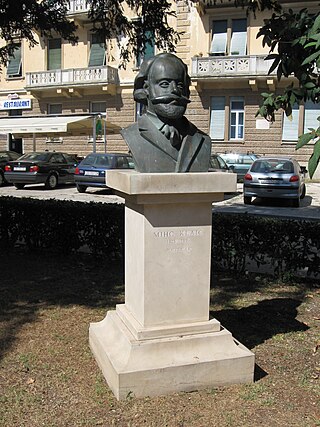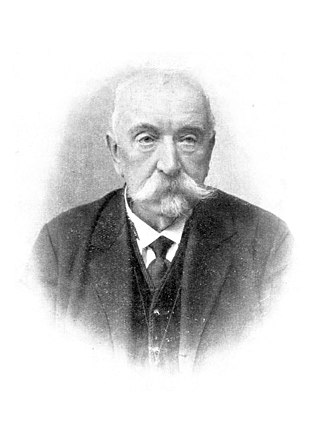Related Research Articles

The Croatian People's Party – Liberal Democrats is a social-liberal political party in Croatia.
This article gives an overview of liberalism in Croatia. Liberals became active since 1860 in Dalmatia and since 1904 in the rest of Croatia. It never became a major political party. It is limited to liberal parties with substantial support, mainly proved by having had a representation in parliament. The sign ⇒ denotes another party in that scheme. For inclusion in this scheme it isn't necessary so that parties labeled themselves as a liberal party.

The Kingdom of Dalmatia was a crown land of the Austrian Empire (1815–1867) and the Cisleithanian half of Austria-Hungary (1867–1918). It encompassed the entirety of the region of Dalmatia, with its capital at Zadar.

The Kingdom of Croatia-Slavonia was a nominally autonomous kingdom and constitutionally defined separate political nation within the Austro-Hungarian Empire. It was created in 1868 by merging the kingdoms of Croatia and Slavonia following the Croatian–Hungarian Settlement of 1868. It was associated with the Kingdom of Hungary within the dual Austro-Hungarian state, being within the Lands of the Crown of St. Stephen, also known as Transleithania. While Croatia had been granted a wide internal autonomy with "national features", in reality, Croatian control over key issues such as tax and military issues was minimal and hampered by Hungary. It was internally officially referred to as the Triune Kingdom of Croatia, Slavonia and Dalmatia, also simply known as the Triune Kingdom, and had claims on Dalmatia, which was administrated separately by the Austrian Cisleithania. The city of Rijeka, following a disputed section in the 1868 Settlement known as the Rijeka Addendum, became a corpus separatum and was legally owned by Hungary, but administrated by both Croatia and Hungary.

StjepanMitrov Ljubiša, was a Serbian and Montenegrin writer and politician. He is famous for his unique short stories, generally ranked among the masterpieces of Serbian literature in its day. These stories are also a symbol of the Serbian rebirth, both for its patriotic message and because it was a fundamental milestone in the Serbian language reform.
The Serb-Catholic movement in Dubrovnik was a cultural and political movement of people from Dubrovnik who, while Catholic, declared themselves Serbs, while Dubrovnik was part of the Habsburg-ruled Kingdom of Dalmatia in the 19th and early 20th centuries. Initially spearheaded by intellectuals who espoused strong pro-Serbian sentiments, there were two prominent incarnations of the movement: an early pan-Slavic phase under Matija Ban and Medo Pucić that corresponded to the Illyrian movement, and a later, more Serbian nationalist group that was active between the 1880s and 1908, including a large number of Dubrovnik intellectuals at the time. The movement, whose adherents are known as Serb-Catholics or Catholic Serbs, largely disappeared with the creation of Yugoslavia.
Constitutional Assembly elections were held in the Kingdom of Serbs, Croats and Slovenes on 28 November 1920. The Democratic Party emerged as the largest faction, winning 92 of the 419 seats. Deputies are elected by secret ballot, in a direct manner, by the electoral quotient system. The 1920 elections were the first democratic elections in the Kingdom of Serbs, Croats and Slovenes. Shortly after the election, the Communist Party of Yugoslavia was banned by the authorities.
Parliamentary elections were held in Kingdom of Dalmatia for the newly formed Dalmatian parliament in 1861.

The Diet of Dalmatia was the regional assembly of the Kingdom of Dalmatia within the Austro-Hungarian Empire. It was founded in Zadar in 1861 and last convened in 1912, before being formally dissolved in 1918, with the demise of the Empire.

Lovro Monti was a Dalmatian politician of Italian descent. He was a Dalmatian Italian, whose grandfather fought for the Republic of Venice against Napoleon, who was also from a family of Italian origin.
The Autonomist Party was an Italian-Dalmatianist political party in the Dalmatian political scene, that existed for around 70 years of the 19th century and until World War I. Its goal was to maintain the autonomy of the Kingdom of Dalmatia within the Austro-Hungarian Empire, as opposed to the unification with the Kingdom of Croatia-Slavonia. The Autonomist Party has been accused of secretly having been a pro-Italian movement due to their defense of the rights of ethnic Italians in Dalmatia. The Autonomist Party did not claim to be an Italian movement, and indicated that it sympathized with a sense of heterogeneity amongst Dalmatians in opposition to ethnic nationalism. In the 1861 elections, the Autonomists won twenty-seven seats in Dalmatia, while Dalmatia's Croatian nationalist movement, the National Party, won only fourteen seats. This number rapidly decreased: already in 1870 autonomists lost their majority in the Diet, while in 1908 they won just 6 out of 43 seats.

Miho Klaić was a Croatian politician and a leader of the Croatian revival in Dalmatia.

Gajo Filomen Bulat was a Croatian lawyer who served as the Mayor of Split and as a member of the Diet of Dalmatia and the Vienna Imperial Council.
The People's Party was a political party in the Habsburg Kingdom of Croatia and the Kingdom of Croatia-Slavonia.
Serb People's Party was political party in the Kingdom of Dalmatia during the time of Austria-Hungary.
Croat People's Union was a Bosnian Croat political party in Bosnia and Herzegovina. Party was founded by Ivo Pilar in 1910 with goal to represent interests of Croats in the Condominium of Bosnia and Herzegovina. With creation of Kingdom of Yugoslavia, HNZ become inactive and was refounded in 1992 by Milenko Brkić and in 2010 it was incorporated into the Croatian Party of Rights of Bosnia and Herzegovina.

Dalmatianism, Dalmatianness or Dalmatian nationalism refers to the historical nationalism or patriotism of Dalmatians and Dalmatian culture. There were significant Dalmatian nationalists in the 19th century, but Dalmatian regional nationalism faded in significance over time in favor of ethnic nationalism.

Mihovil Pavlinović was a Croatian Roman Catholic priest, politician, and writer who led Croatian National Revival in the Kingdom of Dalmatia. He is known as a keen promoter of Croatian political thought in Dalmatia, one of the founders of the liberal People's Party and consistent advocate of unification of Kingdom of Dalmatia and Kingdom of Croatia-Slavonia.

Pero Čingrija was a Croatian politician. As a long-time mayor of Dubrovnik and leader of the People's Party, he was one of the most prominent Dubrovnik and Dalmatian politicians at the turn of the 20th century.
References
- ↑ Branka Magaš. Croatia through history: the making of a European state. Saqi, 2007. P. 387.
- ↑ Mikulas Teich, Roy Porter. The National Question in Europe in Historical Context, p.282.
- ↑ Milovan, Iva; Šetić, Nevio (2008). "Dva općehrvatska skupa iz 1890. i 1893. i njihovo nacionalno integracijsko značenje" [Two General Croatian Meetings in 1890 and 1893 and Their Significance for the National Integration]. Anali Zavoda Za Povijesne Znanosti Hrvatske Akademije Znanosti i Umjetnosti U Dubrovniku (46): 237.